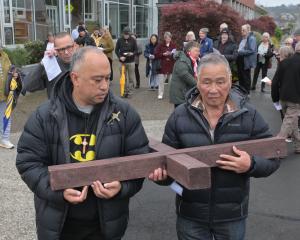Voluntary water restrictions will likely remain in place over summer after fire burned across 5000ha of land at Te Papanui conservation park on Old Dunstan Rd.
The DCC, who stopped taking water from the Deep Creek catchment on Saturday, said yesterday it was pretty sure the catchment was not affected, but would formally confirm today.
DCC Group Manager 3 Waters Tom Dyer said aerial photos provided the confirmation early today and so they started taking water again from Deep Creek this morning.
“Deep Creek is one of our key water catchments so it’s great to know it can continue to supply safe drinking water to Dunedin residents.”
Deep Stream, which usually provides 80% of the city’s water, remains out of action after the fire burnt through 75% of that catchment.
Despite earlier estimations having the burn area at 4664ha, this afternoon Fenz said it had remapped the burn area and have estimated it to be about 5000ha.
Ninety firefighters will be back at the scene today along with infrared cameras to tackle hot spots, as an investigation into its cause begins.
Fire and Emergency New Zealand put out an update on the situation today, saying the fire was contained and a thermal imaging camera would be used over the fire grounds to continue its search for hotspots.
Ground crews would be used to put those hotspots out and four helicopters were on hand to assist.
At a media briefing in Dunedin yesterday, Mayor Aaron Hawkins said the fire had eliminated the use of the main water catchment for Dunedin, the Deep Stream Reservoir.
Water from the catchment was contaminated by ash and a small amount of run-off containing fire suppressant chemicals.
Both the Deep Stream Reservoir and Deep Creek Reservoir were of strategic importance for the Dunedin City Council, he said, as they were the only reservoirs that could supply water to all suburbs in Dunedin.
Dunedin residents were asked to voluntarily conserve water while the severity of the impact to the Deep Stream Reservoir was assessed in the coming weeks by council staff.
The voluntary water restrictions would most likely remain in place over the summer and more formal restrictions could be considered based on the weather over the coming months.
Mr Hawkins said the fire was a significant event, but would have been more severe without the efforts of firefighters.
Dunedin City Council 3 Waters group manager Tom Dyer said the Deep Creek Reservoir would become Dunedin's primary water source as a result of the fire.

Deep Stream would be out of action for anywhere from three months to a year, he said.
Dunedin's average water use was about 44,000 cubic metres a day, he said.
This would continue to be met from a range of treated water sources.
At the briefing yesterday afternoon, Otago district principal rural firefighter Graeme Still said the fire had been contained, but hot spots existed.
At its peak on Saturday, 11 helicopters with monsoon buckets worked to extinguish the blaze working in the skies above four ground crews.
Fifteen millimetres of rain on Saturday night helped firefighting efforts.
It marked the third major vegetation fire in Otago in the past week.
A fire at Cornish Point, near Cromwell, last Monday covered 8ha.
The cause was still under investigation.
A fire at Bucklands Crossing near Waikouaiti, which covered 16ha of land and was believed to have been caused by a vegetation burn-off reigniting, was extinguished yesterday.
A fire investigator would begin work today to establish the cause of the Middlemarch fire.
Fire crews were able to respond quickly because they had previously planned for a potential fire in the area, he said.
About 1100ha of the fire was on Department of Conservation land.
Winds of up to 100kmh, warm temperatures and no vehicle access to the area meant serious challenges for firefighters.
At its peak the fire was spreading across more than 1.5km of land per hour.
A normal rate would be about 300m an hour, Mr Still said.
Comments
Does this mean that Mosgiel will have to switch back to water from bores?
Ironic…The DCC building in Moray Place is being water blasted this morning!
This gives pause for thought about how fragile Dunedin's water catchment is, perhaps money should be spent on better protecting it rather than spending money 'pedestrianizing' the main street or bridges we don't need.











